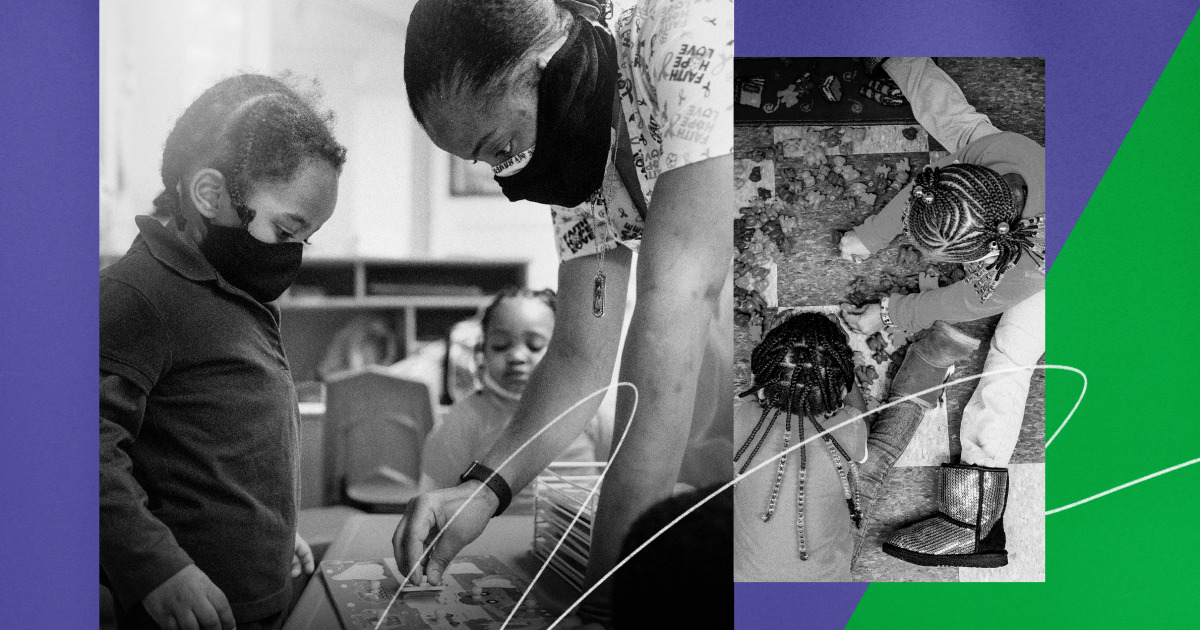
Help us celebrate MSNBC’s first 25 years by joining us every day for 25 days as our anchors, hosts, and correspondents share their thoughts on where we've been — and where we’re going.
If, like me, you’ve spent much of the pandemic hoping a child in your care wasn’t about to wander into your Zoom meeting, I don’t need to tell you the critical role child care plays for parents — especially mothers — and thriving communities. Quite simply, without child care — and, by extension, child care workers — the U.S. economy cannot function. It’s an undeniable, sobering reality. When we talk about “the future of child care,” we’re not talking about robots making our kids a sunflower butter and jelly sandwich. We’re talking about whether there will be accessible and equitable child care at all in the future, 25 years down the road, likely sooner.
The need for quality, affordable child care is well researched and virtually undisputed.
The need for quality, affordable child care is well researched and virtually undisputed. According to the Annie E. Casey Foundation, as of 2019, 68 percent of children under the age of 6 had all available parents in the workforce. That’s more than 15 million children who require care so their parents can work.
Yet despite the clear demand, this country’s child care system isn’t working for parents or for child care providers. The industry is underfunded, inequitable and inaccessible both because there are not enough providers to meet the demand and because the cost is prohibitive for most families (nationally, child care costs between $9,000 and $9,600 a year on average).
Despite the eye-popping price tag, many child care centers are struggling to attract and retain workers. As of May 2020, the median pay for child care workers was just $12.24 per hour. Many of those workers have no health care benefits. Terrifyingly, the industry tasked with caring for our children has incredibly high turnover. It’s no wonder many experts describe the child care industry as a “failed market.”
Changes to child care could take many forms, everything from a shift to home-based care to privateinvestment in flexible work arrangements and other pro-caretaker policies. But to address the full scope of this crisis will require government action. There’s no way around it. In the long list of policy points that define that action, the most obvious is increased pay for these essential workers, along with tax credits and subsidies to make care more affordable.
Still, government action hinges on a cultural shift toward valuing care. This work — performed almost entirely by women, disproportionately women of color and immigrant women — was undervalued and underpaid before the pandemic turned our world upside down. If you Frisbee’d snacks at your children while you led a conference call or, worse, had to reduce your hours or leave your job to care for children, you understand the value of this work more intimately than most. You know it is demanding and high-stakes. We are, after all, talking about cultivating the hearts and minds of the future.
Addressing the child care crisis will determine if parents and specifically mothers are able to return to work, if low- and middle-income parents have the time necessary to build skills that enable mobility and if we are a country that invests in our next generation. The future of child care is the future of our country.
"care" - Google News
July 25, 2021 at 07:36PM
https://ift.tt/2UL5s0a
Covid proved the future of child care is the future of America - MSNBC
"care" - Google News
https://ift.tt/2N6arSB
Shoes Man Tutorial
Pos News Update
Meme Update
Korean Entertainment News
Japan News Update
Bagikan Berita Ini














0 Response to "Covid proved the future of child care is the future of America - MSNBC"
Post a Comment